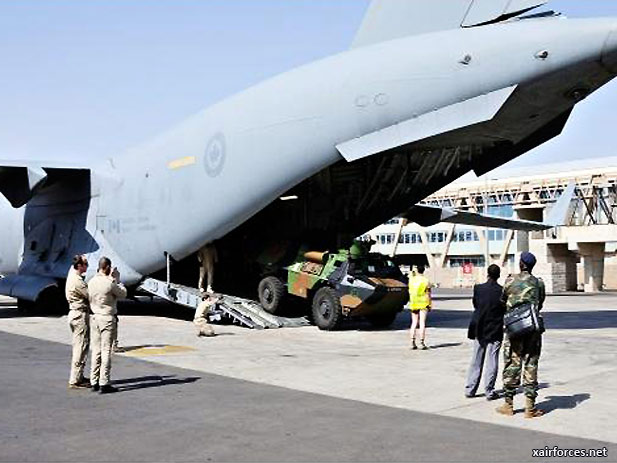
Canadian Forces mission to Mali ends “with a bit of a whimper”

The Canadian Forces mission to Mali quietly ended two weeks ago with no official announcement or explanation.
Military sources say the Royal Canadian Air Force C-17 transport plane, as well as RCAF personnel in Mali assigned to the mission, returned to Canada on April 3. Military personnel were told to remain quiet about the end of the mission but were not given any explanation why it abruptly ended.
Fighting continues in Mali and while France is starting to pull its troops from the country, at least 1,000 are expected to still be there until the end of the year.
Canada’s Mali mission started in mid-January, when the Canadian Forces started providing support to French troops fighting Islamic militants in that African country. Mali had been considered stable until early 2012 when tribesmen seeking an independent country combined forces with Islamic militants to take control of the northern half of the country. That prompted fears the jihadists and other terrorist groups active in a belt spanning Africa just south of the Sahara Desert would use the territory as a home base from which to launch attacks throughout the region and against Western targets.
The large Canadian C-17 aircraft transported French armoured vehicles, trucks, troops and supplies into Mali in support of the French military operations there.
A Canadian Forces liaison officer will remain in Paris for the time being, say military sources.
The Defence Department declined to discuss the Mali mission, referring questions to the Department of Foreign Affairs.
“Canada and France remain in contact about the security situation in Mali,” stated an email sent Thursday by DFAIT spokesperson Amanda Reid. “Canada is coordinating with France to provide a C-17 for strategic airlift support to French Operation Serval as needed.”
Mali’s President Dioncounda Traore used his twitter account in January to announce that Canada had committed to providing logistical support for the war effort. The president’s announcement came less than a week after Prime Minister Stephen Harper said Canada would not provide any direct military aid to Mali. The Canadian government does not consider providing the aircraft to fly combat equipment and troops to Mali as direct military aid.
Defence Minister Peter MacKay’s office had been providing regular updates on the mission until late January. In mid-March the government announced that the plane would remain assigned to the operation as long as needed. But two weeks later Canadian military personnel were told to the mission was over.
Liberal defence critic John McKay said he was surprised the mission had ended and questioned why Parliament wasn’t informed. “It does end with a bit of a whimper,” said McKay. “This is no way to conduct foreign affairs or military affairs. I would think that the public who pays for this type of mission has a right to know about it.”
McKay said he is concerned about the Islamist threat in the region and Canada’s lack of action to deal with that. He noted that Canadian diplomat Robert Fowler, who was held hostage by the al-Qaida group in the region known as AQIM, has warned that the terrorist organization remains a potent force in northern Africa.
Fowler said Thursday that the Canadian military contribution to Mali was “enormously underwhelming” and a more robust response involving special forces was needed. But Fowler said he was not surprised the Canadian mission ended quietly. “The Canadian government’s posture these days is to not to tell people what we do,” he added.
Fowler said the French have started to slowly withdraw some of the 4,000 troops they have in Mali but still expect to have around 1,000 soldiers there by the end of the year.
Al-Qaida is still a threat in Mali and throughout the region, he added. “There are still bombs going off in Goa and Timbuktu and there’s still fighting near Timbuktu,” Fowler said. “Is AQIM finished? The answer clearly is no.”
Canadian military officials would also not respond to a Citizen request for information about Exercise Flintlock. That counter-terrorism exercise involved special forces units from CFB Petawawa training troops from Niger in February and March. Officers involved in past Flintlock exercises have acknowledged that the training helps countries in the region in their battle against al-Qaida.
Al-Qaida gunmen and Tuareg rebels seeking independence from Mali received a boost when NATO forces, including those from Canada, helped overthrow Libyan strongman Moammar Gadhafi in 2011. Both groups re-equipped themselves with weapons stolen from the Libyan government’s military bases.
In January, al-Qaida-linked terrorists, including at least two Canadians, attacked an Algerian gas refinery, taking hundred of workers hostage. During a rescue attempt by the Algerian military, at least 38 of those captives were killed. Then U.S. Secretary of State Hillary Clinton later confirmed the terrorists had been outfitted with stolen Libyan arms.
Source: By DAVID PUGLIESE, OTTAWA CITIZEN NEWS - 18 April 2013
Photo: A French military light armored vehicle is unloaded from a Canadian Forces C-17 Globemaster III in Bamako, Mali, Jan. 17, 2013. Canada’s aid to the French mission in Mali quietly ended in early April. (Photo by Sgt Matthew McGregor , The Canadian Press)
(18.04.2013)
|